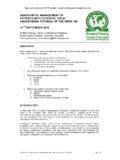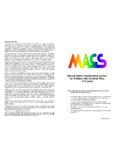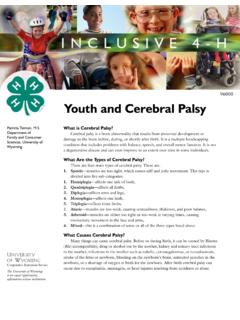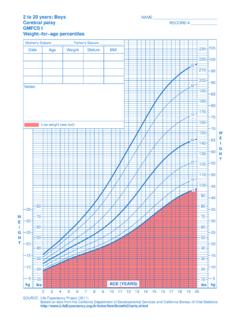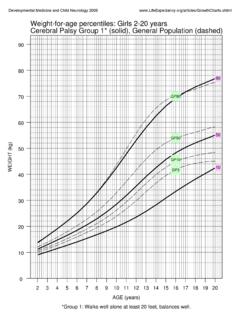Transcription of CP factsheet Cerebral Palsy Research - Capability …
1 CP factsheetCerebral Palsy ResearchCerebral Palsy RegistersThere are two Cerebral Palsy registers in the UK. One is in the North of England, and surrounding counties, and the other is in Northern Ireland. The registers collect and hold information about Cerebral Palsy that is used for Research into the condition. This Research looks at clinical issues as well as causes and trends. United Kingdom Cerebral Palsy Collaboration The United Kingdom Cerebral Palsy Collaboration (UKCP) brought the registers together to provide a basis for the Research . The Research is important in medico-legal settlements and also for determining needs and planning services. The information held by the registers has been put into a single database because the numbers of children born each year with Cerebral Palsy is low- about 2 children per 1000 births. Although the data held by the registers does vary, they all collect basic information such as: year of birth sex birth weight gestational age (how long the pregnancy lasted) type of Cerebral Palsy associated difficulties severity of motor, intellectual and sensory impairments.
2 This meant it was possible to combine the information held by the registers into a single database which was done with a grant from the Medical Research Council. The database contains confidential information about 6910 children born from from the joint database shows that: more males than females have Cerebral Palsy . For every 100 girls born with Cerebral Palsy , there are 135 boys the number of children born each year with Cerebral Palsy has increased over the past few decades, but this is now stabilising and may even be decreasing children born prematurely have an increased risk of having Cerebral Palsy , although the Factsheet2 majority of children with Cerebral Palsy were actually born at full term (37 or more weeks). This is because only a relatively small number of babies are born prematurely the proportion of children with a severe learning disability has decreased over time Measuring the effects of Cerebral palsyMeasuring the effects of Cerebral Palsy on the lives of children, adults and families can be done in a limited way by looking at what individuals are not able to do such as dressing or feeding themselves.
3 Using this approach it has been discovered that: over 66% of children with Cerebral Palsy are able to walk, but many need walking aids about 66% of children with Cerebral Palsy are able to carry out manual tasks such as dressing or feeding themselves about 75% of children with Cerebral Palsy born in the 1990 s don t have a learning disability hearing and visual impairments are less common. About 1 in 50 children with Cerebral Palsy are deaf and 1 in 11 is expectancy studyInformation from the UKCP database and the National Health Service Central Registers of births and deaths for Scotland, England and Wales, and the Central Health Index for Northern Ireland has shown the following: Children who are only mildly affected by Cerebral Palsy will have a life expectancy similar to that of the general population Children affected more severely or profoundly may have a life expectancy below that of the general population.
4 This can be due to the associated complications that occur from immobility or deformity Respiratory disorders and infections are common in children with severe mobility difficulties. Further InformationThe life expectancy study results can be found in the following publications: G. Surman, S. Bonellie, J. Chalmers, A Colver, H. Dolk, K. Hemming, A. King, J. Kurinczuk, J. Parkes and Platt (2006) UKCP: A collaborative network of Cerebral Palsy registers in the United Kingdom. Journal of Public Health. K. Hemming, Hutton, A. Colver and Platt (2006) Regional variation in survival of people with Cerebral Palsy in the United Kingdom. Pediatrics 116 (6): 1383-1390. K. Hemming, Hutton and Pharoh (2006) Long term survival for a cohort of children with Cerebral Palsy . Developmental Medicine and Childhood Neurology 48: 90-95. More detailed information on the results obtained from the life expectancy project can be found at: CP FactsheetThis factsheet can be made available in other formats audio, large printTelephone: 0131 313 5510 Textphone: 0131 346 2529 Fax: 0131 346 7864 Email: Charity SCO11330 Capability ScotlandWesterlea11 Ellersly RoadEdinburghEH12 6 HYOur Advice ServiceAdvice Service Capability Scotland is a national disability advice and information service.
5 We specialise in information on Cerebral Palsy . We offer: information on Capability Scotland services advice on Cerebral Palsy general advice on disability issuesYou can get in touch with us by calling, e-mailing, dropping in or writing a work from the UKCP collaboration is available through the UKCP coordinator:Mary Jane PlattE-mail: 2014

